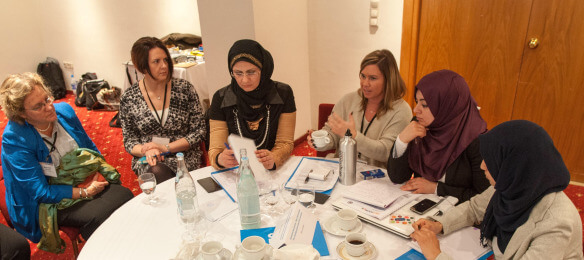Guest post by Marie Carter, Professional Mentor
Marie participated in the 2015 TechWomen Delegation Trip to Tunisia. Below is an account of the trip in March, originally posted on the Women’s Enterprise for Sustainability (WES) blog.

TechWomen Mentor, Marie Carter, leading a group discussion on e-commerce during the WES Social Media for Women Entrepreneurs TOT
“In Tunisia we can’t sell our products online.” This is what I learned when leading a discussion group on e-commerce in Tunisia during the Women’s Enterprise for Sustainability (WES) Social Media for Women Entrepreneurs Training of Trainers (TOT) meeting last week. I anticipated sitting down with a group of trainers to discuss best practices on setting up an online store, branding, configuring shipping, etc., but instead the topic turned to the current challenges Tunisian entrepreneurs face in selling online. Due to the closed currency in Tunisia*, entrepreneurs will be blocked from selling goods on the internet until the government restructures its banking system and removes restrictions on the dinar. This fact made our discussion of e-commerce take a different, yet fruitful turn. There are many best practices that can be applied to e-commerce as well as to marketing a brick and mortar store, which is what many of the WES entrepreneurs are currently doing. Here are some highlights from our discussion:
- Tell a story: Every product has a story. Whether it’s the story of how the maker crafted the product, the product’s meaning in a local culture, or a historical reference, every object tells a tale. It’s these stories that help buyers connect with products and brands. Consumers often want to understand not only what the product is, but why it has meaning. Make sure to always tell the story of your products, through your website, catalog or in personal interactions with prospective customers.
- Photography is key: Your products are beautiful in real life, so they should look great in photos! Photograph each item individually or perhaps together in a scene showing how it’s used. Photographs help connect your audience with the product and allow them to imagine how they would use it in their lives. Photographs are an essential part of selling products online, and can be used to advertise in local media or in your store catalog.
- Help people find you: The internet is a big place with lots of stuff to buy. You want to make sure that people can find your products easily and quickly. It’s important to host your products using an online store or website that is searchable, and preferably has filtering options so buyers can narrow down what they are looking for. Also use words in your product descriptions that you think people may use in a search. If you’re selling out of a store, organize your products in a way that helps your customers easily find what they are looking for.
- Connect your customers: Consumers want to hear from other customers before they buy. By publicly sharing reviews from other buyers, you can help new prospects see what others love about your products. Reviews give your brand credibility and effectively help people ‘try before they buy’ online.
It’s apparent that Tunisia has work to do before local entrepreneurs can reap the full benefits of e-commerce, but it must be done. In 2014, sellers using Etsy, a popular e-commerce platform, generated sales of $1.39 billion USD, up 43.3% from 2013. The demand for Tunisian products is out there and Tunisian entrepreneurs are ready to sell. In the meantime, local business owners should begin applying these and other best practices to their physical stores so they are ready when the barriers to e-commerce are removed.
 Marie is a Technical Support Engineer at Yahoo in San Francisco, CA. She served as a TechWomen Professional Mentor in 2014 and attended the 2015 TechWomen Delegation trip to Tunisia. Marie has a B.A. in International Studies and is thrilled to combine her passions for new technologies and inter-cultural communication to support women across the globe. LinkedIn:www.linkedin.com/pub/marie-carter/15/517/181/en
Marie is a Technical Support Engineer at Yahoo in San Francisco, CA. She served as a TechWomen Professional Mentor in 2014 and attended the 2015 TechWomen Delegation trip to Tunisia. Marie has a B.A. in International Studies and is thrilled to combine her passions for new technologies and inter-cultural communication to support women across the globe. LinkedIn:www.linkedin.com/pub/marie-carter/15/517/181/en
*As a closed currency, the Tunisian Dinar (TND) is not allowed to be imported or exported from the country. Additionally, there are strict limitations to its convertibility. “Tunisian Activists Launch ‘Where is Paypal” Campaign” by Jeremy Fryd, January 13, 2015.

